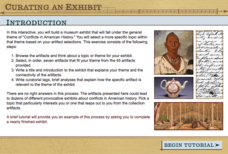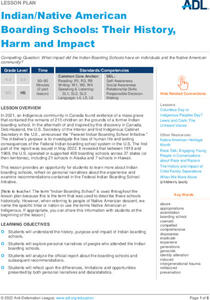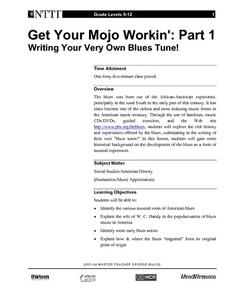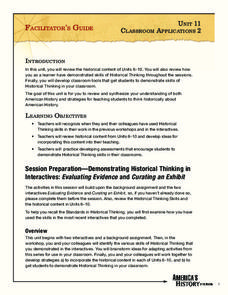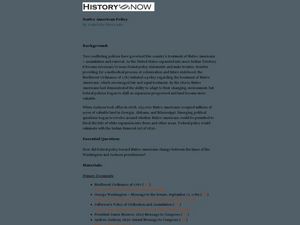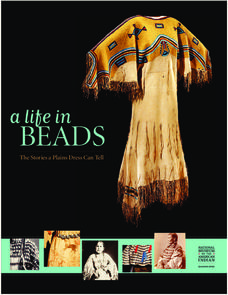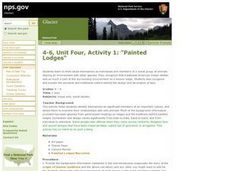Constitutional Rights Foundation
History of Immigration From the 1850s to the Present
The Statue of Liberty may embrace the huddled masses of the world, but has American society always joined in? After young historians read a passage about the history of American immigration in the 19th and 20th centuries, focusing on...
National Endowment for the Humanities
Lesson 1: The United States Confronts Great Britain, 1793–1796
After the Revolutionary War, the success of the United States was far from guaranteed. Foreign powers coveted the new land, and Great Britain challenged American sovereignty. Learners consider the challenges facing the new nation using...
Crafting Freedom
F.E.W. Harper: Uplifted from the Shadows
What is stereotyping, and how do we handle stereotyping in our daily interactions? Your young historians will not only have the opportunity to learn about the first African American woman to publish a short story–Frances Ellen...
Stanford University
Evaluating Historical Sources on Juana Briones
Most have never heard of Juana Briones, the incredible woman who came to own property and divorce her husband in 1850s California. Yet, her relatively unknown life reflects the historical dynamics of the American West, particularly those...
Annenberg Foundation
Curating an Exhibit
A curated exhibit at a museum has a point of view. Artifacts are selected and arranged to cause viewers to contemplate this point of view or theme. An interactive provides class members with an opportunity to create an exhibit, to curate...
Anti-Defamation League
Indian/Native American Boarding Schools: Their History, Harm and Impact
Encultureate, assimilate, or eliminate? The 2021 discovery of a mass grave of over 200 children on the site of a former Canadian Indian Boarding school led to the creation of the Federal Indian Boarding School Initiative. High schoolers...
PBS
African American History: Lunch Counter Closed
Young historians investigate and evaluate the effectiveness of the strategies the Civil Rights Movement used to end segregation in the United States. After watching an video interview with Carl Matthews and Bill Stevens who participated...
John F. Kennedy Center
Harriet Tubman: Retelling History Through Dance and Drama
Scholars listen to several pieces of music in preparation for a discussion about how instruments and lyrics convey emotions. With Harriet Tubman as the focus, small groups create an original song or dance. A reflection piece concludes...
Curated OER
Get Your Mojo Workin': Part 1 Writing Your Very Own Blues Tune!
Upper graders listen to the blues. They discuss blues scale, read a description of the blues, and work together to write an original piece. A lesson like this ties into American history and African-American musical contributions very...
National Woman's History Museum
Defying British Rule: Women's Contributions to The American Revolution
Primary and secondary sources are the focus of a lesson that showcases the important role women played during the American Revolution. Pairs review sources and discuss their findings. A close-reading of an informational text leads the...
Annenberg Foundation
America's History in the Making: Classroom Applications Two
Reading between the lines helps discover important information! The 11th lesson of a 22-part series on American history has scholars use historical thinking skills to uncover the deeper meaning behind the words on a page. Using backward...
Annenberg Foundation
America's History in the Making: Classroom Applications Four
The final installment of a 22-part American history series examines the many faces that make up the country's story. From Henry Ford to Tulio Serrano, scholars use biographical evidence and Internet research to uncover the people behind...
Annenberg Foundation
America's History in the Making: Using Digital Technologies
How can digital technology of today link us to the events of the past? Scholars use technology to uncover the vast number of historical resources available in lesson 12 of a 22-part America's History in the Making series. Using databases...
Curated OER
African-American Soldiers in World War I: The 92nd and 93rd Divisions
Students research the role played and contributions made by African American soldiers during World War I. They discuss the evolution of civil rights in America's history, and the progress that has been made in the last 100 years.
Curated OER
Native American Policy
Students examine federal policies regarding Native Americans. In this Native American assimilation and removal policies lesson, students conduct research to compare the changes in federal policy regarding Native Americans between the...
Curated OER
History of Modern Cuba
Set the context for the often-strained relationship between the US and Cuba with this informative and entertaining presentation. From political cartoons to photographs of Fidel Castro and Fulgencio Batista, as well as heartbreaking...
C3 Teachers
African American Voices and Reconstruction: What Does It Take To Secure Equality?
High schoolers research the 13th, 14th, and 15th Amendments, as well as other primary source documents, to determine Reconstruction's impact on the North and South. The 34-page inquiry-based lesson includes a staging question and...
Smithsonian Institution
A Life in Beads: The Stories a Plains Dress Can Tell
Young learners discover how the Sioux and Assiniboine tribes preserved native culture through the making of traditional dresses, identifying the resources used to make the dresses and discussing behind the meaning behind some American...
US House of Representatives
“‘The Negroes’ Temporary Farewell,” Jim Crow and the Exclusion of African Americans from Congress, 1887–1929
Despite some advances made during the Reconstruction Era following the Civil War, the period from 1887 through 1929, African Americans serving in Congress suffered severe setbacks due to Jim Crow Laws and voter suppression. Class members...
DocsTeach
Assimilation of American Indians
Imagine being forced to give up your culture and then being graded on how well you complied with orders to do so. Documents show young historians the price indigenous peoples paid as a result of the Dawes Act, which was essentially a...
Curated OER
Painted Lodges
Students explore lodge construction as a representation of culture. In this cultural diversity and Native American history lesson, students listen to a narrative explaining the origin of Native American painted lodges. Students design...
National Woman's History Museum
Rosie the Riveter: The Embodiment of the American Woman’s Economic and Social Awakening
Critical events force change. World War II forced a change in perceptions of and attitudes toward women. When thousands of men joined the military American factories were left shorthanded. Young historians investigate how media was used...
Curated OER
Construction Comparison Project Record Sheet
A well-designed table is here for those who are studying Native American history. They choose an Indian tribe, then conduct research which enables them to fill in each of the blanks in the table.
DocsTeach
Uncle Sam and the American Diet
Uncle Sam wants you to follow the food pyramid! Scholars analyze two images of propaganda posters the government created to promote the food pyramid. Academics complete a worksheet to understand the impact of the campaign and end the...
Other popular searches
- Native American History
- South American History
- African American History
- History of American Women
- Central American History
- Ancient American Cultures
- African+american+history
- 1800s American History
- 1700s American History
- African American History
- Early American History
- African American History Month






